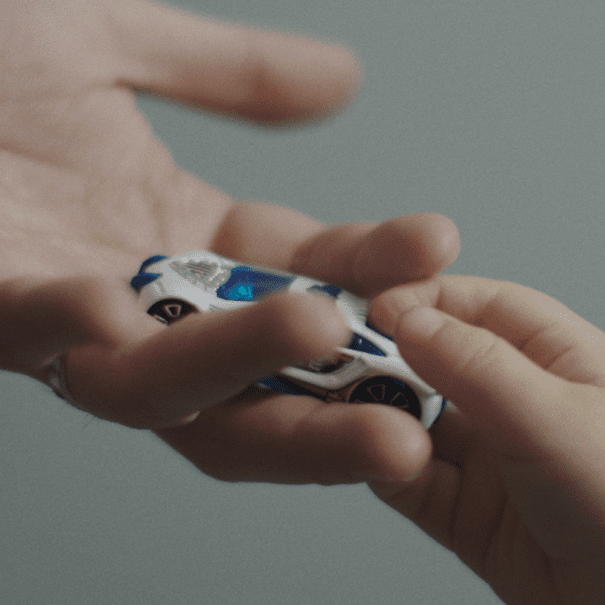Overview
Hunter Syndrome
Learn about the disease that drives our cause and affects the lives of our community.

THE BIG PICTURE
What is Hunter Syndrome?
Think of it this way: when your garbage can gets full, you take out the trash. But what if you can’t? What if bag after bag fills up, taking over your kitchen? Soon, it would be hard to walk around, cook, or clean. As the trash builds even higher, your kitchen becomes unusable. Similarly, children with Mucopolysaccharidosis Type II (MPS II), also known as Hunter syndrome, are unable to make the enzyme that takes care of our cellular garbage; their bodies becoming like the kitchen in this example.
Hunter syndrome is a rare genetic disease that is progressively debilitating, life-limiting and without a cure. It occurs almost exclusively in males and currently affects approximately 500 boys in the U.S. and less than 2,000 worldwide. Individuals with Hunter syndrome have a defect in the gene that normally causes the body to make the enzyme iduronate-2-sulfatase (I2S) – the “garbage man” – which is responsible for the breakdown of cellular waste called glycosaminoglycans or GAGs – the cell’s “garbage.” Without that necessary enzyme, the accumulation of these GAGs leads to progressive damage throughout the entire body.
Treatment Options and Emerging Therapies
While there is currently no cure for Hunter syndrome, there are approved treatments available and several promising therapies in development. Every family’s journey is unique, and we encourage you to speak with your physician about the best options for your child.
Currently Approved Treatments
Elaprase (idursulfase)
Elaprase is an FDA-approved enzyme replacement therapy (ERT) that replaces the missing iduronate-2-sulfatase enzyme. It is given through weekly intravenous infusions and can help reduce many of the somatic (body-related) symptoms of Hunter syndrome. However, it does not cross the blood-brain barrier and does not treat cognitive symptoms.
Hematopoietic Stem Cell Transplant (HSCT)
This treatment involves transplanting healthy donor stem cells into a child with Hunter syndrome. It may slow disease progression in some individuals, particularly when performed early. However, HSCT carries significant risks and is not widely used for Hunter syndrome. It is typically considered only in select cases and should be discussed thoroughly with a qualified medical team.
Emerging Therapies in Development
Several experimental therapies are currently in the pipeline, offering hope for more comprehensive treatment options. These therapies are at different stages of the approval process:
DNL310 – A next-generation ERT designed to cross the blood-brain barrier.
Status: Biologics License Application (BLA) filed with the FDA.
RGX-121 – A gene therapy designed to deliver the I2S gene directly to the central nervous system using a one-time infusion.
Status: BLA filed with the FDA.
JR-141 – A fusion protein that combines the I2S enzyme with an antibody to cross the blood-brain barrier.
Status: Currently in clinical trial.
Autologous Gene-Edited Hematopoietic Stem Cell Transplant – A stem cell-based gene therapy approach using a patient’s own modified cells.
Status: In clinical trial phase.
Prenatal Enzyme Replacement Therapy – A groundbreaking investigational approach where enzyme replacement is delivered before birth to potentially prevent early damage.
Status: In clinical trial.
Important Reminders
Project Alive does not provide medical advice or endorse any specific treatment. Please speak directly with your physician or a metabolic/genetic specialist to determine what options may be appropriate for your child.
For the most up-to-date information on clinical trials, including how to find or contact a clinical trial site, visit ClinicalTrials.gov.
Our team at Project Alive is here to help guide and support you as you explore available treatments and trials.
Common Terminology in Hunter Syndrome
Understanding key terms can help families and caregivers feel more confident and informed when navigating diagnosis, care, and treatment. Below is a glossary of commonly used words and phrases, organized by category.
Genetics & Diagnosis
Hunter Syndrome / MPS II
A rare, X-linked genetic disorder caused by a deficiency of the enzyme iduronate-2-sulfatase (I2S). Also known as Mucopolysaccharidosis Type II.
X-linked disorder
A condition linked to the X chromosome. Because males have only one X chromosome, they are more likely to be affected.
Carrier
A female who carries one copy of the altered gene. She typically shows no symptoms but can pass the gene to her children.
Genetic testing
A test used to confirm a diagnosis or carrier status by analyzing DNA.
Newborn screening
Testing performed shortly after birth to detect rare diseases, including Hunter syndrome in select states.
Symptoms & Clinical Features
Coarse facial features
Distinctive facial traits that may include a broad nose, thick lips, prominent forehead, and enlarged tongue.
Macrocephaly
An abnormally large head, common in children with Hunter syndrome.
Hepatosplenomegaly
Enlargement of the liver (hepato-) and spleen (spleno-).
Contractures
Stiffening or tightening of joints, limiting mobility and range of motion.
Neurodegeneration
Progressive loss of brain function, often leading to developmental regression.
Regression
The loss of previously acquired developmental skills (language, mobility, etc.).
Hyperactivity
Elevated levels of movement and impulsive behavior, often linked to central nervous system involvement.
Sleep apnea
A condition where breathing repeatedly stops and starts during sleep, often due to airway obstruction.
Short stature
Below-average height due to skeletal involvement.
Hearing loss
Common in Hunter syndrome due to frequent ear infections and structural changes.
Thickened skin
Skin may develop a pebbly texture, especially on the upper back and arms.
Hydrocephalus
Buildup of cerebrospinal fluid in the brain that can increase pressure and cause complications.
Medical & Therapeutic Terms
Iduronate-2-sulfatase (I2S)
The enzyme missing or deficient in individuals with Hunter syndrome.
Glycosaminoglycans (GAGs)
Complex sugars that build up in cells when I2S is lacking, causing progressive damage.
Enzyme Replacement Therapy (ERT)
Treatment that replaces the missing enzyme through IV infusions (e.g., Elaprase). Helps with somatic symptoms but does not reach the brain.
Intrathecal therapy
Delivery of treatment directly into the spinal canal to bypass the blood-brain barrier. This form of treatment is no longer available outside of patients in the original clinical trial under the post access program.
Gene therapy
A treatment approach that introduces a healthy copy of a faulty gene into the body to restore enzyme function.
Vector
A modified virus or carrier used to deliver therapeutic genes in gene therapy.
Blood-brain barrier (BBB)
A protective barrier that prevents many substances, including most ERTs, from reaching the brain.
Infusion reaction
A possible immune response to ERT infusions, ranging from mild to severe symptoms. Providers can prescribe medications before infusions to alleviate reactions in most cases.
Supportive therapies
Non-curative interventions that improve quality of life (e.g., physical, speech, and occupational therapies).
Care & Support Services
Multidisciplinary team
A collaborative team of healthcare providers from multiple specialties managing the child’s care.
Palliative care
Care focused on improving comfort, managing symptoms, and supporting emotional well-being — whether or not curative treatment is pursued.
IEP (Individualized Education Plan)
A personalized plan for children with disabilities to receive accommodations and services in school.
Respite care
Short-term care that gives families temporary relief from caregiving responsibilities.
WHAT TO LOOK FOR
Signs and Symptoms
Learn about how Hunter syndrome presents itself and the signs and symptoms that are commonly seen through those affected.


The Specifics
Understanding the Disease
Can Hunter syndrome Be Cured?
No cure exists for Hunter syndrome. Currently, the only FDA-approved treatment on the market, enzyme replacement therapy (ERT), can stabilize many of the physical symptoms of Hunter syndrome. However, as it cannot cross the blood-brain barrier, it is unable to prevent cognitive regression, meaning the child will continue to decline to an infantile state.
How Common Is Hunter syndrome?
Hunter syndrome (Mucopolysaccharidosis/MPS II) is a rare condition affecting between 1 in 100,000 to 1 in 150,000 male births, although it is estimated that the grouping of MPS conditions collectively affect 1 in 25,000 births in the United States (MPS conditions include MPS I, II, III, IV, VI, VII and ML II and III).







